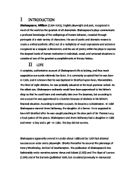Mr. Shakespeare attended Stratford Grammar School on a scholarship due to his father’s influence. William was taught a standard Elizabethan program of study with a priority on Greek and Latin literature (including the playwrights Plautus and Seneca, and the passionate poet Ovid), expression (from ancient Roman speaker Cicero), and Christian ethics (a large knowledge of the Holy Bible). These influences are all-encompassing in Shakespeare's works, and it is also clear that Shakespeare refined knowledge of English history through archives written shortly before and during his youth. Shakespeare left school in 1579 at fifteen; no explanation is truly known (internetshakespeare.uvic.ca.) Shakespeare did not pursue formal education any further: he never attended a university and was not thought of to be a truly scholarly man.
From 1585 to 1592, scholars have entirely no primary source materials about William Shakespeare. In November of 1582, at the age of eighteen, he married Anne Hathaway (a woman eight older than he); six months later he gave birth to a daughter, Suzanna. Two years after that, William and Anne had twins: Hamnet and Judith. Hamnet, Shakespeare's only son, passed after only eleven years. Rumor has it that William was not happy in his marriage, and this may be the reason he ran off to pursue the London theatre scene. In fact, during the late 1580s and early 1590s, Shakespeare traveled back and forth between London and Stratford-on-Avon, but by this time, the momentum of Shakespeare's life was toward his career and away from family, hearth, and home. Although we lack hard facts, we may surmise that before he took up a career as a playwright, Shakespeare engaged in a variety of occupations, probably working with his father in commercial trades (leathers and grains), probably working as a law clerk, and possibly serving as a soldier or sailor for an England threatened by Spain. (the-tech.mit.edu/Shakespeare) Shakespeare displays an authority of the dialect and the practices of much such technique, as in his representation of the judicial system in trial scenes of The Merchant of Venice.
Shakespeare wrote most of his plays as “quarto texts”, on a sheet of paper folded four ways. A few of his works were printed in his lifetime, though they appeared more in volume after his death, sometimes plagiarized and often changed at the whim of the printer. First Folio would be the first collection of his dramatic works, a massive undertaking to compile thirty-six plays from the quarto texts, playbooks, texts, and the memories of actors. The approximately nine hundred page document took about two years to complete and was printed in 1623 as Mr. William Shakespeare’s Comedies, Histories, & Tragedies. It also featured on the plaque the famous engraved portrait of Shakespeare by Martin Droeshout (1601- 1651). (Tales from Shakespeare, Charles Lamb.)
With the favor of the court, “The Kings' Men” became the well-known theatre company of the day. Anne and the children lived in Stratford while Shakespeare spent his time travelling between Stratford and London, dealing with production relationships, writing and acting. On April 23, 1616, William Shakespeare life had passed, according to his monument, and lies buried in the chancel of the Holy Trinity Church in Stratford upon Avon. His wife, Anne, dies only seven years after William and lies in the grave next to his. No answers are given to tell us how or why Shakespeare died, but in 1664 the reverend John Ward, vicar of Stratford recorded that "Shakespeare, Drayton and Ben Johnson had a meeting, and it seems drank too hard, for Shakespeare died of a fever there contracted." His tombstone is inscribed with the following epitaph;
“Good friend for Jesus sake forbeare
To digg the dust encloased heare
Blessed by y man y spares hes stones
And curst be the y moves my….”
As a musical theatre major for my undergraduate work in college, Shakespeare was part of my everyday living. From having to write my own performance piece, in Shakespearean form, to having to decipher the smallest sentence he has written, Shakespeare and his magnificent gift to this world will live on until the end of time. His contribution, not just the Renaissance, but to every person on this earth is one of great passion and pleasure. Being “famous” in the time of Shakespeare was unheard of, only royalty had that honor. By Williams’ talent and hard work, he made his name remembered. From having this brilliant manuscript published, having his portrait painted by M. Droeshout and work with the best actors England had to offer, Mr. Shakespeare will always be a well versed “celebrity” in my eyes. His method and style of writing, made me want to continue to act and speak his eloquent words. Most students find his work tedious and boring, but if they only took the time to read for meaning, they would fall in love with the words in front of them.
SOURCES:
Web:
the-tech.mit.edu/Shakespeare
TEXT:
Civilization Past & Present (11th edition); Brummett, Edgar, Hacket, Jewsbury & Molony. 2006
The Shakespeare Riots: Revenge, Drama, and Death in Nineteenth-Century America; Nigel Cliff. 2006
Tales from Shakespeare; Charles Lamb. Date Unknown.







